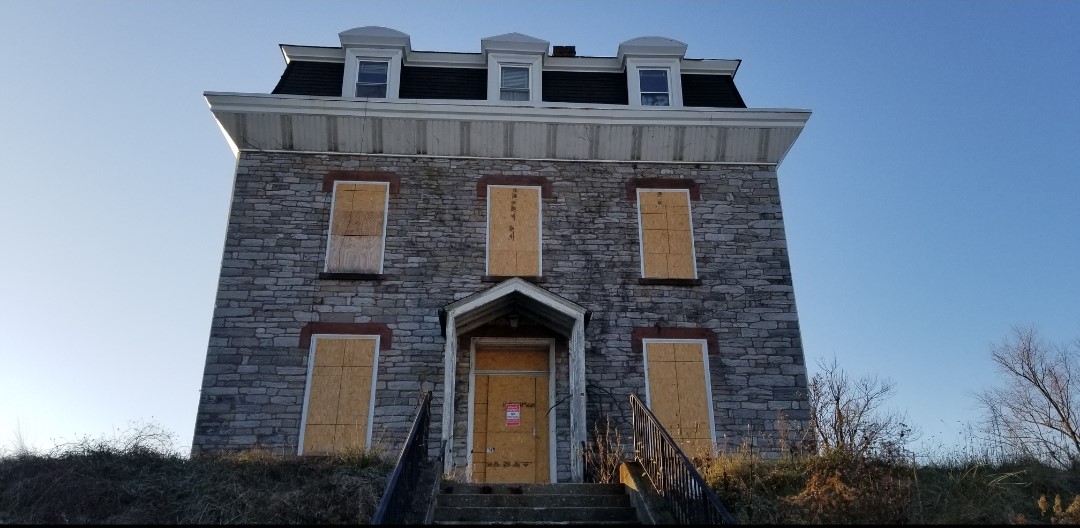Save the Donaghmore/Patch Mansion
Lebanon School District Superintendent and School Board

We are writing to urge you to save the Donaghmore/Patch Mansion.
In May 2025, the Lebanon School District School Board announced their purchase of the former Lebanon Catholic School Property, which includes the Donaghmore/Patch Mansion. They indicated that they plan to demolish ALL buildings currently on the property. By default, this would include the historically-relevant Donaghmore/Patch Mansion.
This building is historically important as it stands as the last remaining edifice of the iron ore furnaces that once occupied the site, having first been built as the iron master’s home when the location was the Dudley Furnace, and later, the Donaghmore Furnace. As such, it is a testament to our county’s rich contributions to Pennsylvania’s iron industry. It was subsequently owned by the Patch Family, famous in both local industry/transportation and the U.S. military. Among the best-known was Alexander M. Patch, who, after his military career, eventually became president of the Cornwall Railroad. His sons Joseph Dorst Patch and Alexander M. Patch, Jr. became a major general and lieutenant general, respectively. Alexander M. Patch, Jr. has been considered by many military historians, including Keith E. Bonn, to be the “most underrated general of WWII." Later, the building was purchased by the American Legion and eventually by Lebanon Catholic High School who owned it until the most recent previous purchases by a developer, then the Lebanon School Board.
In recent years, it has been severely neglected and vandalized. Now it is threatened by imminent demolition. This is no way to treat a survivor of our ever-dwindling built heritage. Given this building’s presence in the community for well over a century and a half, and its historical importance to local industrial, transportation, and military history, it’s essential that this building be saved and adaptively reused.
Data shows that more often than not, adaptive reuse of existing buildings is more economical and environmentally-friendly than demolition and new construction; it costs less while using fewer non-renewable resources and reusing existing elements, which means it creates less landfill waste, and of course contributes to less carbon emissions due to reduced transportation of materials and waste.
As our public-school system’s legislative body, the superintendent and school board are stewards of public trust, and according to the Education Law Center of Pennsylvania, it is the school board’s responsibility to make their decisions using input from the public. It is also their responsibility to use tax dollars wisely. Given the already costly purchase of the property and widespread public outcry about the cost, it is incumbent on them to consider adaptive reuse of this building as a way to spend less tax dollars than they would if it were included in demolition plans. It is also in the community’s best interest not to lose another physical piece of its history.
Please sign this petition in support of urging the Lebanon School District superintendent and school board to use the Donaghmore/Patch Mansion in their future site plans rather than demolish it.
Sponsored by
To:
Lebanon School District Superintendent and School Board
From:
[Your Name]
Dear Dr. Malinoski and the LSD Board of Directors,
I am writing as a result of the recent news that you plan on demolishing all existing buildings on the site of your recent purchase, the former Lebanon Catholic School property. This would include the one-of-a-kind historic Donaghmore/Patch Mansion by default.
I urge you to save this important physical piece of our local history for a number of reasons.
1) Historical Importance:
This building is historically important as it stands as the last remaining edifice of the iron ore furnaces that once occupied the site, having first been built as the iron master’s home when the location was the Dudley Furnace, and later, the Donaghmore Furnace. As such, it is a testament to our county’s rich contributions to Pennsylvania’s iron industry. It was subsequently owned by the Patch Family, famous in both local industry/transportation and the U.S. military. Among the best-known was Alexander M. Patch, who, after his military career, eventually became president of the Cornwall Railroad. His sons Joseph D. Patch and Alexander M. Patch, Jr. became a major general and lieutenant general, respectively. Alexander M. Patch, Jr. has been considered by many military historians, including Keith E. Bonn, to be the “most underrated general of WWII.” His legacy of humble achievement and diplomacy continues to represent a standard for the best kind of leadership.
2) Cutting further costs and waste:
Data shows that more often than not, adaptive reuse of existing buildings is more economical and environmentally-friendly than demolition and new construction; it costs less while using fewer non-renewable resources and reusing existing elements, which means it creates less landfill waste, and of course contributes to less carbon emissions due to reduced transportation of materials and waste.
3) Community benefits:
Adaptive reuse of historic buildings brings many economical, environmental, and social benefits to a community. Specialized work on historic buildings increases jobs for specially-skilled tradespeople, many of whom may be local. Communities benefit from the lower levels of pollution involved compared to that of all-new construction. Most importantly, community members are more engaged within communities that instill a sense of place, or a unique shared environment and identity that can’t be found in other communities. This kind of security of place and identity is especially important for youth.
Adaptively reusing the site benefits you as well. Costs that would otherwise be incurred by the more expensive demolition and all-new builds might be diverted to other needs on your agenda, decreasing the need to levy even greater tax burden on school district citizens who are already dismayed by the cost of the site purchase. And by saving this building, you will be further contributing to the community’s best interest by protecting another piece of its ever-dwindling built history.
I hope you will save this building and be an example of preservation as progress in the Lebanon community.